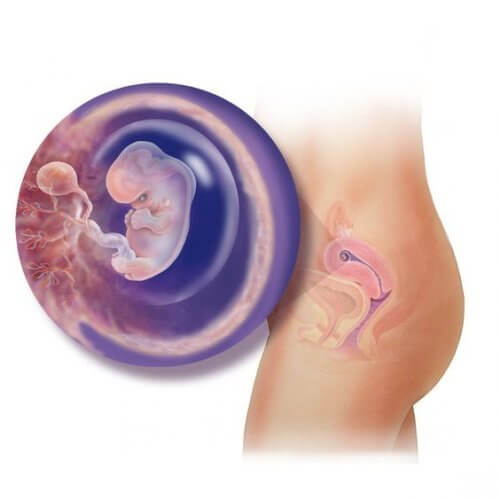Development of the Fetus: Phases and Influential Factors

An embryo becomes a fetus during the eighth week in the womb. At this stage of development of the fetus, it already measures approximately one and a half centimeters and its weight is not quite a gram.
Despite being the size of a bean, the fetus is already making its first movements. Of course, these are still imperceptible to the mother.
During this period of the development of the fetus, features and extremities begin to form. The lips, eyelids, nose and ears develop at the beginning of pregnancy, as do the fingers and toes.
As for the osteo-muscular structure, the bones that begin to take shape can be seen through the skin, although at this stage they are still just cartilage. In turn, the heart and liver are functional and continue to develop.
Subsequently, the fetus will develop even more week by week until the moment it meets the world that awaits it.

What changes does the mother go through during the development of the fetus?
Some symptoms that pregnant women may suffer at this stage are:
- Discomfort or pain in the belly area as the fetus increases in size
- Weight gain, for the same reason
- Increase in breast size. This is explained by the expansion of the ducts where the milk will circulate.
- Nausea and vomiting
- More sensitive sense of smell. This can generate vomiting by feeling averse to certain foods or unpleasant odors.
- Fatigue. The body is working vigorously to create another person inside it. This can cause a lot of fatigue, in addition to deterioration in rest due to any of the aforementioned symptoms or nerves.
Factors that can alter the fetus’ normal development
The main factor, or at least the most important one, is the mother’s diet. Several foods can generate change in the behavior of the fetus. Generally, it is said that sweets induce greater movement.
Therefore, it is essential that the mother eats a healthy and balanced diet throughout her pregnancy. And this does not mean “eating for two,” but rather eating the proteins, vitamins and other specific nutrients that both will need throughout the gestation period.
It is also important to avoid unhealthy habits such as smoking or drinking alcohol.
In addition, if you suffer from any food pathology, such as high cholesterol, diarrhea or diabetes, you must give yourself specific care. Consult a doctor before complications arise in order to avoid major problems in the future.
On the other hand, a study published in the American Journal of Obstetrics and Gynecology confirms what many others have said so far: exercise during pregnancy is safe and can benefit both the mother and the baby.
Moderate-intensity aerobic activity is most recommended during pregnancy. This includes swimming and brisk walking. In addition, experts also often recommend leisure activities such as gardening.
Anyway, it is always better to consult a specialist to choose the type of exercise to perform.
It is also very important that you perform periodic ultrasounds to make sure everything is running smoothly.
With an ultrasound, you can see the baby, hear his heart and check his growth. These are very important for the control and monitoring of pregnancy.
Signals to watch for during the development of the fetus
According to the Sutter Health network of hospitals and doctors, it is important for the mother to consult with her trusted doctor if any of the following symptoms appear:
- Blurred vision, spots or bursts of light, with or without a headache
- An area of hot, reddened pain in the calf or behind the knee
- Pain or burning when urinating, or urinating with unusual frequency
- Fever of 100.4 degrees Fahrenheit or greater for more than 24 hours
- Sudden severe or continuous pain, or cramping in the lower abdomen
- Bleeding or vaginal spotting
- Injury in your stomach
- A sudden severe swelling of your hands, feet or face
- Sores or blisters in the vaginal area (possibly herpes)
- Symptoms of vaginal infection, including itching, burning and an unusual discharge
- Being involved in a car accident
- Continuous flow of a small amount of fluid from the vagina, or a stream of water from the vagina
- Nausea, diarrhea or vomiting for more than 24 hours
Ultimately, it is noteworthy that the advancement of technology has made it possible to detect many complications that the fetus may present throughout its gestation, such as diabetes or spina bifida.
This is another point in favor of regular checkups.
An embryo becomes a fetus during the eighth week in the womb. At this stage of development of the fetus, it already measures approximately one and a half centimeters and its weight is not quite a gram.
Despite being the size of a bean, the fetus is already making its first movements. Of course, these are still imperceptible to the mother.
During this period of the development of the fetus, features and extremities begin to form. The lips, eyelids, nose and ears develop at the beginning of pregnancy, as do the fingers and toes.
As for the osteo-muscular structure, the bones that begin to take shape can be seen through the skin, although at this stage they are still just cartilage. In turn, the heart and liver are functional and continue to develop.
Subsequently, the fetus will develop even more week by week until the moment it meets the world that awaits it.

What changes does the mother go through during the development of the fetus?
Some symptoms that pregnant women may suffer at this stage are:
- Discomfort or pain in the belly area as the fetus increases in size
- Weight gain, for the same reason
- Increase in breast size. This is explained by the expansion of the ducts where the milk will circulate.
- Nausea and vomiting
- More sensitive sense of smell. This can generate vomiting by feeling averse to certain foods or unpleasant odors.
- Fatigue. The body is working vigorously to create another person inside it. This can cause a lot of fatigue, in addition to deterioration in rest due to any of the aforementioned symptoms or nerves.
Factors that can alter the fetus’ normal development
The main factor, or at least the most important one, is the mother’s diet. Several foods can generate change in the behavior of the fetus. Generally, it is said that sweets induce greater movement.
Therefore, it is essential that the mother eats a healthy and balanced diet throughout her pregnancy. And this does not mean “eating for two,” but rather eating the proteins, vitamins and other specific nutrients that both will need throughout the gestation period.
It is also important to avoid unhealthy habits such as smoking or drinking alcohol.
In addition, if you suffer from any food pathology, such as high cholesterol, diarrhea or diabetes, you must give yourself specific care. Consult a doctor before complications arise in order to avoid major problems in the future.
On the other hand, a study published in the American Journal of Obstetrics and Gynecology confirms what many others have said so far: exercise during pregnancy is safe and can benefit both the mother and the baby.
Moderate-intensity aerobic activity is most recommended during pregnancy. This includes swimming and brisk walking. In addition, experts also often recommend leisure activities such as gardening.
Anyway, it is always better to consult a specialist to choose the type of exercise to perform.
It is also very important that you perform periodic ultrasounds to make sure everything is running smoothly.
With an ultrasound, you can see the baby, hear his heart and check his growth. These are very important for the control and monitoring of pregnancy.
Signals to watch for during the development of the fetus
According to the Sutter Health network of hospitals and doctors, it is important for the mother to consult with her trusted doctor if any of the following symptoms appear:
- Blurred vision, spots or bursts of light, with or without a headache
- An area of hot, reddened pain in the calf or behind the knee
- Pain or burning when urinating, or urinating with unusual frequency
- Fever of 100.4 degrees Fahrenheit or greater for more than 24 hours
- Sudden severe or continuous pain, or cramping in the lower abdomen
- Bleeding or vaginal spotting
- Injury in your stomach
- A sudden severe swelling of your hands, feet or face
- Sores or blisters in the vaginal area (possibly herpes)
- Symptoms of vaginal infection, including itching, burning and an unusual discharge
- Being involved in a car accident
- Continuous flow of a small amount of fluid from the vagina, or a stream of water from the vagina
- Nausea, diarrhea or vomiting for more than 24 hours
Ultimately, it is noteworthy that the advancement of technology has made it possible to detect many complications that the fetus may present throughout its gestation, such as diabetes or spina bifida.
This is another point in favor of regular checkups.
This text is provided for informational purposes only and does not replace consultation with a professional. If in doubt, consult your specialist.








